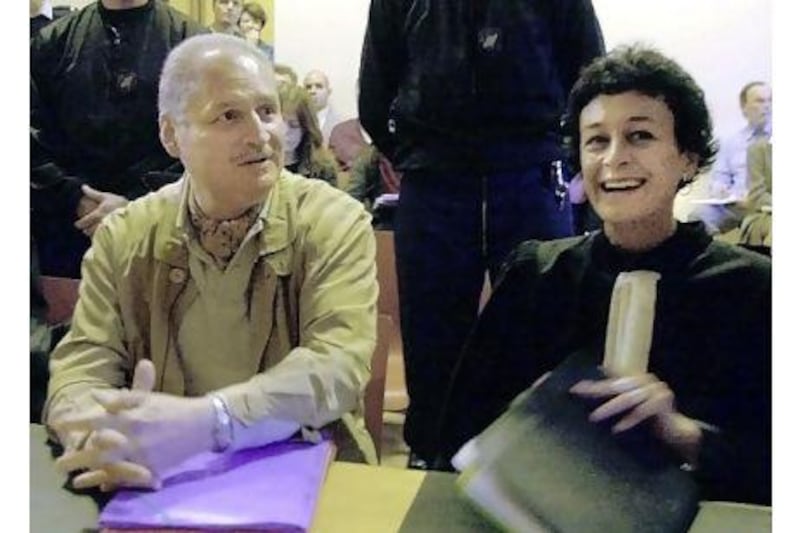Ilich Ramirez Sanchez, who as Carlos the Jackal was once regarded as the world's most wanted fugitive, has begun another life sentence after being convicted of masterminding four bombings that killed 11 and wounded nearly 200 in France in the 1980s.
Defence lawyers said the verdict was "scandalous" and a sop to public opinion rather than based on clear evidence. An appeal will be lodged, leading under the French criminal justice system to a second trial.
A Parisian court set a minimum of 18 years to be served before Ramirez could qualify for parole. Now 62, the Venezuelan self-styled revolutionary is already serving life imprisonment for separate murders.
Before being convicted, he delivered a rambling five-hour speech at the Palais de Justice, admitting responsibility for numerous operations around the world but denying involvement in those for which he was on trial.
Ramirez, whose notoriety in the 1970s and 1980s was comparable to that of Osama bin Laden in subsequent decades, said he felt no shame for any of his actions,
He said the "struggle" would continue, warned the judges they bore personal responsibility for the trial's outcome and tearfully hailed Col Muammar Qaddafi as a man who had done more than anyone for revolution.
Ramirez has been held in France since he was smuggled out of Khartoum in 1994 after collaboration between French secret services and Sudanese authorities ended what he believed was safe exile.
He was jailed for life - after another lengthy speech to the court - for the murders of two French intelligence officers and a Lebanese informer in Paris in 1975. Ramirez denied responsibility, blaming them the shootings on Israeli Mossad agents,
In the latest case, he was accused carrying out a series of attacks in 1982 and 1983, including the bombing of a Paris-Toulouse high-speed train in which five people died. The blast occurred a few days after a deadline passed for the release of two members of a revolutionary group Ramirez had created.
In his address to the court, Ramirez - who had already declared himself "a revolutionary by profession, of the Leninist tradition" - said he accepted "political and military responsibility for all attacks committed by the International Revolutionary Organisation (his own group) and the Popular Front for the Liberation of Palestine (PFLP)", in pursuance of the Palestinian cause.
However, he said there was nothing to link him to the acts for which he was now being tried. He ridiculed the case against him as akin to a second-rate comedy series.
He also proclaimed a sense of pride in his past: "I have no shame, I never betrayed, I never complained."
Ramirez expressed regret "to my family, my children, my wife, for the price they paid to be with me". Early in the trial, which began six weeks ago, he had shed new light on his life, telling the court he had four children - not one as previously believed - by different mothers.
And he spoke of a desire to return to Venezuela, where he grew up the son of a wealthy Marxist lawyer. "I'm not going back to hijacking planes," he said. "That's no longer for one of my age, but I have things to do in my country. The combat continues."
For Ramirez, it is a combat that dates from 1970 when, after studying in Moscow at a college with a reputation for attracting foreign communists, he travelled to Lebanon and volunteered for service in the PFLP.
He underwent guerrilla training and fought with the movement in the Black September conflict in Jordan before returning to Europe and, it is suspected, taking part in a number of shootings and bombings against Jewish interests in London and Paris.
In 1975, the same year Ramirez was alleged to have killed his Lebanon-born PFLP contact turned informer, Michel Moukharbal, and two French agents, he also led his most spectacular operation.
He led a guerrilla unit that seized 63 hostages, including oil ministers, at the Vienna headquarters of Opec. Most were eventually released, but not before three people - an Iraqi Opec employee, a Libyan delegate and an Austrian police officer - had been killed. Ramirez's aims had reportedly included the murders of two ministers, Ahmed Zaki Yamani of Saudi Arabia and Iran's Jamshid Amuzegar, but both survived.
Ramirez was later linked to a wide range of attacks, sometimes as a Cold War mercenary based in what was still the Communist eastern European bloc, sometimes in the cause of Palestine. He spent time in East Berlin, Budapest and South Yemen before taking refuge in Sudan.
A convert from Catholicism to Islam, he considers a radical French lawyer, Isabelle Coutant-Peyre, also a key figure of his legal team, to be his wife. They had a Muslim marriage ceremony in prison in 2001 though this has no legal force in France because both were married to other people at the time.
Three other people were tried in absentia for involvement in one or more of the 1980s bombings. Joannes Weinrich, a German national held in his own country for other crimes, and Ali Kamal Al Issawi, a Palestinian whose whereabouts is unknown, were also jailed for life. Another German, Christa Fröhlich, was acquitted.
foreign.desk@thenational.ae
* Additional reporting by Agence France-Presse







